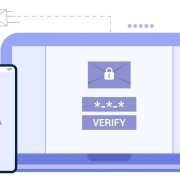Top Scams to Watch Out For in 2024
Last Updated on February 16, 2024
Scammers. They're a nasty bunch, always finding new ways to cheat, lie, and exploit people out of their hard-earned money or sensitive information. Some tricks are old classics, but many are fueled by ever-evolving technology.
Don't get me wrong, the internet and new advancements can be amazing! But with any good thing, there's also the unfortunate potential for misuse, and when it comes to scams, the risks are ever-present. Let's get ahead of the curve. This guide arms you with knowledge about the most dangerous current scams and what we might see in the near future. Consider it your ultimate protection field!
Table of Contents
Exploiting Trust & Basic Human Nature
Scammers are, sadly, skilled at manipulating how we think and feel. Let's break down some tactics they use to prey on our emotions.
Recovery Scams: Preying on Desperation
If you've fallen victim to a scam or suffered a financial loss due to a major event (like a large, publicized crypto exchange collapsing), be extremely wary of anyone promising to recover your funds for a fee. Sadly, recovery scams are vicious: scammers pose as lawyers, government agencies, or even the original scammer seeking payment to continue their “investigation.”
Always remember: legitimate professionals don't get paid until they recover your money. Do thorough research on any company offering ‘recovery' services using sources like the Better Business Bureau (https://www.bbb.org/).
Grandparent & Family Emergency Scams: The AI Upgrade
The devastating grandparent scam, in which criminals pose as someone's grandchild desperate for financial help, isn't new. However, the danger level is increasing due to advanced AI. Deepfakes, where voice and image manipulation create very convincing imitations, make it almost impossible to tell if you're hearing your loved one in real-time.
If you receive an out-of-the-blue, panicked plea via phone call or video chat, don't trust it immediately. Hang up and try contacting your relative directly via their usual number or another family member to verify. Never wire money or send gift cards until you've confirmed it's truly your loved one and not a cruel imposter.

Scams Fueled by Technology & New Platforms
Technology continues to change our lives, connecting us, providing entertainment, and making tasks easier. Unfortunately, just as tech creates opportunity, it opens new doors for exploitation. Here are the tech-assisted scams to pay special attention to:
AI-Fueled Scams: It's More Than Just Fake Products
Fake product listings generated with AI that look unbelievably real. This scam tactic is quickly advancing. It might now be easy to spot fakes in 2024 – imagine scammers fabricating full online profiles with an AI-generated photo, a convincing bio, and even phony social media posts to sell a bogus investment “opportunity.”
Beyond individuals trying to cheat you, remember AI fuels deepfakes that target regular people with blackmail. Deepfake editing software can place anyone's face into a compromising video, with scammers later demanding payment to keep the “footage” under wraps. Be extremely cautious about video calls with those you don't know well, and never share sensitive images online.
“Smart Home” Hack Attacks: Convenience Comes at a Cost
Thermostats, lights, doorbells, and voice assistants make our homes “smarter,” but they also come with risks. Scammers search for security flaws in our connected devices. Imagine getting alerts that your smart speaker mysteriously purchased items without your knowledge or having security systems compromised to give criminals access.
Always research brands thoroughly before integrating smart devices into your home. Check trusted review websites for reported security flaws. Stay vigilant concerning connected devices with voice activation technology that handles payment and banking apps.
Social Media Impersonation Scams: Followers Are Not Your Friends
Scammers are experts at impersonation. They love making copycat accounts of celebrities, companies, or even ordinary people and sending private messages with phony links or urgent money requests. Remember, just because a verified checkmark (or imitation mark) is next to a social media name, it doesn't guarantee trust.
Scammers bank on a mix of excitement and panic to catch people off guard. Beware of “giveaways” or offers requiring your credit card to “cover shipping.” And even more worrying, be suspicious of seemingly harmless offers by influencers promising fast cash for seemingly simple work. If it sounds too good to be true, it almost certainly is!
Physical Dangers & Increased Targeting
We often focus on online threats, but old-school techniques, physical dangers, and targeting specific groups with scams remain very real – here's where to exercise an extra level of caution:
“Pump Switching” and In-Person Surveillance: Your Gas Fill-Up Isn't Safe
“Pump Switching” is a bold scam targeting distracted drivers at gas stations. Criminals offer help replacing the nozzle; they intentionally fail to do it properly, allowing them to refill their vehicle on your card after you drive away. Other variants target your bank and pin information through carefully hidden cameras rigged above keypads.
To protect yourself, always replace the nozzle securely yourself! Choose pumps away from potential hiding spots to reduce hidden camera risks. Watch your surroundings as you pump and carefully monitor credit card statements for charges from unfamiliar gas stations.
Physical Mail Fraud: They Know What You’re Paying For
Targeting privacy gaps with utility bills, scammers send letters claiming urgent action is needed, or you'll lose utility service. Fake notices demand “past due” payment using bogus customer service numbers that connect you directly to criminals seeking a quick steal. Other fraud uses public property records: you may receive an official-looking “property deed transfer notice” – with urgent instructions to make payment for what appears to be your own home!
Never rely on phone numbers on unsolicited mail. Contact service providers or government agencies directly using well-established public contact information not provided in these bogus communications.
Targeting the Young: Teens as Money Mules
This dangerous scam plays off teens' desires for easy money. Using fake “influencer” or “brand partnership” opportunities, teens are encouraged to open personal accounts for quick payments from the “employer.” In reality, teens unknowingly aid scams as ‘money mules’ (laundering stolen funds through seemingly harmless transactions). The teen faces severe legal consequences while the original criminals evade capture.
Have frank conversations with teenagers in your life. Stress the risks of giving out personal information, especially bank details or routing numbers. Advise them that they never handle or accept payments online in exchange for a cut, regardless of the legitimacy or desperation promised in the opportunity.
Everyday Services – Beware of Imposters
Everyone utilizes essential services. Unfortunately, this familiarity presents opportunities for exploitation. It's crucial to keep a skeptical eye on any communication pretending to represent these common entities to spot the deceptions:
Jury Duty Scams: Official Appearance, Fraudulent Intent
This tried-and-true scam persists because it works. Imposters pose as law enforcement, claiming you failed to attend jury duty and issue threats unless you immediately settle hefty fines. Scammers prey on fear through phone calls or official-looking physical mailers that look remarkably real.
Don't fear – legitimate agencies use established channels and deadlines for notification and don't demand payment as a first resort. If you sense something is amiss, hang up or ignore communications, then independently research court or law enforcement contact information on their official websites (NOT in any correspondence you've received). Report attempted jury duty scams immediately.
Utility Cut-off Threat: Playing on Privacy Gaps
Utility bills often contain account numbers and partial personal information – scammers use this against you. Threatening immediate utility termination, phony letters, or notices include bogus “customer service numbers.” These numbers never connect you to your genuine utility providers but instead land directly in the hands of scammers hungry for credit card details to settle an entirely made-up “balance.”
Never rush a decision when someone creates urgency surrounding payments. Double-check your latest utility statement for accurate contact information, and disregard scare-tactic numbers from any other source. Utility companies rarely threaten a shut-off without numerous documented communication attempts preceding a disconnection.
Tech Support & Refund Scams: Preying on Data Breaches & Fears
News about high-profile data breaches causes alarm. Enter those posing as tech support for affected companies demanding sensitive login details to secure compromised accounts. Other deceptive offers concern accidental overcharging of “subscriptions” – scammers use remote-access software to appear “helpful” but gain entry to bank details or implant malware instead.
Remember, a company would never initiate a call out of the blue and request your username and password via an unsolicited request. Always verify by independently dialing legitimate tech support numbers listed on official company websites, never through links provided in any email or text.

Emerging and Predicted Threats
This section isn't a crystal ball into the future but an informed look based on what scammers already exploit and how their attacks adapt. Remember, awareness is one of your strongest defenses:
Fake Travel Websites: The Vacation That Isn't
With increased travel interest, scammers capitalize on bargain searches. Fraudulent airline and rental company websites may look incredibly real, offering enticing deals for flights, accommodations, and even “package deals.” But after you input your payment and identification details, oh, poof! The deal, website, and scammers disappear. This type of fraud may even use fake customer reviews and stolen images from the legitimate company they are impersonating, raising the sophistication.
Always book travel through well-established booking platforms or go directly to the source with trusted airline and hotel websites. Be extremely suspicious of “too good to be true” deals, and research any unfamiliar booking site through sources like Trustpilot: https://www.trustpilot.com/ for independent reviews.
Advanced SMS-Based Fraud: It's No Longer Just Phishing
We're accustomed to suspicious emails claiming bank fraud or “package undeliverable” texts with deceptive links. But increasingly, scammers target our reliance on our phones for everything. Texts pretending to be a bank alert urging “immediate action” to prevent identity theft will now lead to malicious app downloads under the guise of “protecting yourself.” Don't panic! Contact your bank or institution with their well-published customer service number – this allows you to bypass false urgency designed to make you act without time to think.
Information Warfare & Social Manipulation: It's More Than Just Money
Be extra watchful concerning divisive online topics and news stories sparking strong emotions, particularly around election season. AI-generated profiles flood social media platforms with manipulative content to sow discord and sway public opinion. This doesn't aim at direct monetary gain but undermines society, influencing voting and public sentiment around significant issues.
Fact-check with reputable news sources (Reuters: https://www.reuters.com/, AP News: https://apnews.com/) and always try to see an issue from multiple perspectives. Never rely on a single social media post, influencer, or sensational video for important information.
Conclusion
While it's disheartening that people constantly seek to prey on others, this knowledge offers valuable protection. An informed individual is far less likely to fall victim to these schemes. Let's summarize some action items to turn what we've discussed into practice:
- Always Be Skeptical: If something seems too good to be true or creates sudden panic, question claims and research independently.
- Verify, Don't React: Use familiar channels to ensure validity. Never blindly trust the information given – take control and reach out on your terms.
- Protect Your Info: Don't share passwords, account details, or seemingly routine information unless it's an established, secured, and expected interaction you’ve initiated.
Take Action and Stay Informed
Beyond your defense, let's all do our part to protect those around us:
- Share what you learned from this guide on social media using the hashtag #StaySafeFromScams2024.
- Talk to a vulnerable loved one about one important tactic to watch out for based on their online habits.
- If you discover a new scam, help keep others safe and report it on trusted sites like FTC (Federal Trade Commission): https://reportfraud.ftc.gov/ or IC3 (Internet Crime Complaint Center): https://www.ic3.gov/.
With knowledge, skepticism, and vigilance, we can reduce the chances of falling victim to scams. As new tricks emerge, I invite you to share your observations and keep discussions of new threats open, helping to make our community less vulnerable.
Keep your data safe! Contact iFeeltech's security experts for answers. Explore our IT Blog for proactive cybersecurity tips.










Leave a Reply
Want to join the discussion?Feel free to contribute!